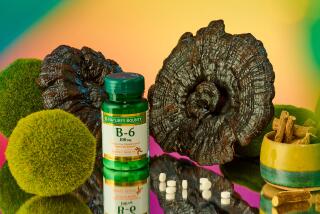Energy Drinks, Straight Up or Mixed, Stir Debate
- Share via
At 17, he already knows his liquor, but he’s not so proud of this that he wants his name in the newspaper. At any rate, he’s convinced that it wasn’t the vodka that did him in.
It was the mixer.
While visiting with friends in upstate New York in late November, he settled down in front of the TV with a cocktail made of two shots of vodka and a can of Red Bull, a popular so-called energy drink with a sweet, medicinal taste. Awhile later, he went to the bathroom and passed out. He awoke after a few minutes.
“I’ve had drinks like that before,” says the 175-pound high school senior from Avon, Conn., referring to the two-shot booze content. But he’d never mixed it with Red Bull before--although he said that kids his age do this regularly. Since then, he said, “I’ve heard stories that it’s bad for you.”
He can add his experience to the mountainous pile of tales, urban legends and sketchy facts that swirl around beverages called energy drinks--soft drinks that are usually carbonated and typically loaded with caffeine, sugar and a grab bag of amino acids, vitamins, minerals and herbal ingredients. Besides Red Bull, there are such brands as Adrenaline Rush, KMX, 180 and Venom.
Experts on alcohol use and on nutrition have concerns about these beverages--especially when they’re used with alcohol. But these same experts say that there is no hard data suggesting that energy drinks are harmful. In any case, there is little to support the claims that energy drinks are healthful or provide any energy beyond their sugar and caffeine kick.
“I think it’s a fad; I don’t think there is an explicit danger,” said Dwayne Proctor, assistant professor in the Department of Community Medicine and Health Care at the University of Connecticut Health Center and a researcher at the university’s Alcohol Research Center. Proctor said he was surprised to hear someone order a “Red Bull and Absolut” vodka in a bar recently. The place was equipped with a small, bar-top refrigerator just for cold cans of Red Bull.
Market leader Red Bull, made in Austria for more than a decade, was in the headlines this summer when three young Swedes died after drinking the beverage. Two were mixing it with vodka and the third guzzled it after a gym workout. Swedish officials said they’re investigating possible ill effects of booze and Bull, but they have not banned the product.
Emmy Cortes, director of communications for Red Bull North America in Santa Monica, said there are no facts that suggest Red Bull caused any of the deaths in Europe. She noted that billions of the distinctive blue-and-silver cans have been sold around the world. The total caffeine load per 8.3-ounce can is 80 milligrams, or about the same as a cup of coffee from Starbucks.
Like other energy drinks, Red Bull has an ingredient list that reads like the One-a-Day vitamin label. Besides sugar, there are such nutrients as niacin, vitamins B-6 and B-12 and pantothenic acid (a vitamin) as well as glucuronolactone (a substance found in the body that is part of the metabolic process).
The drink’s marquee ingredient (featured on the front of the can) is taurine, an amino acid, which is produced naturally in the body. (Contrary to one popular myth, the taurine in Red Bull is not obtained from bulls’ testicles.)
Cortes said that she’s well aware that Red Bull is being sold in bars, although she said it’s sold mainly in convenience stores. The makers of Red Bull and of SoBe Adrenaline Rush take the same line when it comes to bar sales: Energy drinks make the perfect alternative to booze.
“It’s great for the designated driver,” said Kristine Hinck, spokeswoman for South Beach Beverage Co. of Norwalk, Conn., the operating unit of PepsiCo that makes SoBe Adrenaline Rush.
But it’s the energy drink-as-mixer that is raising eyebrows among some people who study alcohol use and abuse. They say the caffeine-alcohol combo could make the drinker into a drunk who is not sleepy. He or she might drink more or might get behind the wheel.
“It might lull them into a false sense of security,” said Dr. Marc Bayer, medical director of the Connecticut Poison Control Center at the University of Connecticut Health Center in Farmington.
In that way, said Proctor, it’s probably a lot like an Irish coffee, which is a mix of a depressant (alcohol) and a stimulant (caffeine).
“The true danger would be in the perception that they’re drinking something healthy in addition to drinking something alcoholic,” said Proctor. “That perception may cause you to drink more.”
How healthful are energy drinks? One can ask the same question about dietary supplements. Most healthy people with a varied diet don’t need them. Some supplements may even interfere with prescription medicines. Ilene Heller, senior staff attorney at the Center for Science in the Public Interest in Washington, said it’s unlikely that energy drinks contain effective doses of the few additives that may have some scientific validity.
The center wants the U.S. Food and Drug Administration to take action against so-called functional foods--those laced with dietary supplements--that make misleading label claims or contain substances such as ginkgo and echinacea that can be sold as capsules or teas, but are not approved food additives. In the past two years, the FDA has sent warning letters out to some functional juice and tea makers.
But it’s not yet clear whether beverages such as energy drinks are technically foods with additives or liquid dietary supplements, which are subject to different regulations.
Either way, Heller says, there is no evidence that they’re good for you.
“If consumers are taking these things thinking they’re going to get something out of them,” she said, “they’re mistaken.”
*
Garret Condon is a reporter for the Hartford Courant, a Tribune company.






